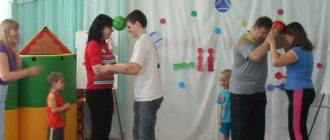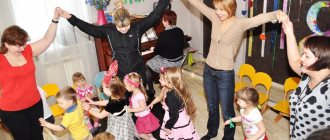All children in the world are united by a love of games.
Play is a natural need for a child, since it is in the form of play that children learn about the world, understand how it works, and consciously comprehend the experience gained.
Play is important not just as a source of joy and good mood, it develops the brain, imagination, creativity, vocabulary, social skills, the ability to learn and perceive more complex information.
How do 6-7 year old children develop?
At this age, the baby’s thinking abilities enter a new, better stage of development.
By age 6, most children:
- master reading, writing, counting to 20;
- understand the simplest time intervals;
- focus longer on one solution to one logical problem;
- their reasoning becomes more meaningful;
- understand information better by listening.
What games are useful at this age?
For a preschooler, different forms of games will be useful.
Psychologists recommend involving children in the following game formats:
- child-initiated play;
- play initiated by an adult;
- a traditional game when both a child and an adult can take the initiative.
From the point of view of benefits, the most significant games are those offered by adults, since in this case the child finds himself in a learning situation, gets acquainted with new words, concepts and can make this situation manageable.
As for choosing a specific game format, it all depends on the situation. For the street, outdoor games are selected that contain an element of sports. At home, you can play board games or role-playing games, or assemble a construction set.
1. Outdoor games develop coordination, strength, endurance, and reaction speed. At the age of 6-7 years, the game lasts about half an hour.
2. Board games help brighten up your leisure time when the weather is bad outside. With the help of cubes, puzzles, figures, cards, the child improves his skills - logic, spatial thinking, social interaction, speech, concentration, will.
There are a huge number of board games - walkers, puzzles, cubes, mosaics, construction sets, flashcards, strategies.
3. Educational games - in this case we are talking about the targeted development of a specific skill or ability, for example, speech, gross motor skills, intelligence, imagination.
The use of such games prepares fertile ground for the further development of the child’s creative abilities and talents. The training program is structured from simple to complex, but the conditions of each task should be slightly ahead of the child’s developmental level.
Types of games on the theme “May 9”
Based on the fact that gaming activity accompanies all methods of organizing educational activities, the theme “Victory Day” is implemented in the following types of games:
- didactic (in verbal, board and printed games, games with objects);
- outdoor activities (in team and individual competitions, attention games);
- theatrical (in dramatizations, including to illustrate physical education lessons).
Games on the theme "Victory Day" usually have musical accompaniment.
Educational, that is, didactic games, are used mainly in the process of educational activities or when performing routine tasks (for example, verbal games can be played while walking), while active and theatrical games are more focused on organizing leisure activities: matinees, sports festivals.
At the same time, the goals of gaming activities in the context of the “Victory Day” theme will be common:
- gaining knowledge about the history of the country;
- development of speech, thinking and basic physical abilities;
- instilling a sense of pride in the heroism of the people during the Second World War.
These goals are specified in the context of each type of game for all age groups.
Games on the theme “Victory Day” can be held not only indoors, but also outdoors
Games 30. Plant
First of all, you need to make a plant - a tree, a flower - from any available materials. Then the child composes a fairy tale about him. The main thing is that in the story the child describes in detail how the plant feels - is it comfortable or is something bothering it.
Through these metaphors, an adult can understand what is bothering the child. If there is a cause for concern, ask your child what you can do to help the plant - build a fence, call a fairy, plant other trees. This way the baby will use the example of a fairy tale to cope with his anxieties.
Games 31. Face games
In children who have suffered some unpleasant events in life, a frozen mask may appear on their face and emotions disappear. You can motivate your child in several ways - invite him to play tricks, make funny faces with him, or organize a home theater.
Games 32. Simple holidays
Allow your baby to feel the holiday in your life as often as possible. Try to turn every simple event into something bright and unusual. For example, the festival of making the bed, washing, the festival of lunch. Be sure to record any of your child’s achievements, write them down or draw them - this motivates and builds confidence in yourself and your abilities.
Games 33. Color therapy
If your child often returns to unpleasant events in the past, focus his attention on the current day, for example, come up with a specific color for each day of the week and try to stick to it. For example, let Monday be blue - pick up such clothes, look for blue objects around.
Games 34. Schedule
To stabilize a child’s condition after a stressful situation, it is necessary to structure his daily routine, draw up a schedule, and decorate it. The kid must monitor its implementation. On the one hand, it teaches discipline, and on the other, it distracts from unpleasant thoughts.
Advice! Anxious children prone to stress intuitively choose outdoor games where they need to jump. This helps relieve tension and feel supported. Create an area for your child where he can jump safely and happily.
Conflict situations sometimes occur between children, and here play becomes critically important, since with its help the child relieves stress and relaxes . Of course, games should be appropriate for the child’s age and development, be diverse and useful. This is what we will talk about in our material.
A selection of games for older preschool age
As in the case of younger preschoolers, the tasks of studying the topic “Victory Day” for children in the senior and preparatory groups are consonant: to summarize materials related to the events of the Second World War, to stimulate interest in studying the history of the country and their family, so the games can also be grouped into one common selection.
Table: didactic games on the theme “May 9” for older preschoolers
| Game name/type | Attributes | Conditions |
| “What a real soldier should be”/verbal | Ball (optional) |
|
| “Who can assemble a machine gun faster” / desktop-printed | Picture puzzle of 10–16 elements |
|
| “Name the proverb”/verbal | Ball | The teacher throws the ball, the child catches it and calls out the proverb, explaining how it fits the topic:
|
For the game “Who can assemble the machine faster,” the picture is cut into 10–16 parts
Table: themed outdoor games for older preschoolers
| Game name/type | Attributes | Conditions |
| "Who is faster"/team competition |
| There are things on two chairs. At a signal, two children - representatives of different teams - begin to get dressed. The one who can do it faster and better wins. |
| Shoot down the enemy plane/team competition |
|
|
| “Help the wounded”/individual competition |
|
|
| Fast Boat/Individual Competition |
|
|
| "Scout"/game for attention |
| |
| "Tails"/individual competition | Small pieces of rope according to the number of participants. |
|
Video: outdoor game “Help the Wounded” in the senior group
Table: theatrical games for older preschoolers
| Name of the game | Attributes | Conditions |
| "Hospital" |
| Children replay the entire procedure of a wounded soldier entering a hospital, being admitted, providing assistance, filling out a card, etc. |
| "Scouts and Foot Soldiers" |
|
|
In the older group, games of different types are combined into one plot, for example, a quest to find a hidden task
Games have invaluable methodological potential for realizing the goals and objectives of the educational process. Moreover, both in the GCD format, and during matinees, leisure activities, and when performing routine tasks. With the help of the game, children more easily perceive material even on such a complex topic as “Victory Day,” which, according to the Federal State Educational Standard, is studied by preschoolers of all age groups.
Where to find time to play with your child
This question is asked by many parents, since modern moms and dads are busy people who have a lot of household responsibilities, work, of course, and a natural desire to take time for themselves and relax. Due to the fact that there is not enough time to spend with the baby, parents often worry and worry. Psychologists assure that you can find time to communicate with your child if you follow simple tips.
Tip 1 – play with your child and mind your own business at the same time.
Games that do not require special training or additional items can be played in the kitchen, bathroom, or on the street. If you don’t feel like playing, involve your child in homework, do something together, for example, make pizza, or just let your child help you.
The main thing is to talk to the child more, explain, praise and support.
Tip 2 – use any free minute.
Transport, queues, the road to somewhere - this time can be used profitably. Tell your child about natural phenomena, make riddles, compose fairy tales, play counting and words.
Tip 3 – games and activities should become a habit.
Of course, we are not talking about classes for an hour or two. Make it a rule to work with your child every day for 15-20 minutes; this will be quite enough for a child aged 6-7 years. For example, read a book to your child before bed.
Tip 4 – try to create a nurturing environment at home.
Use posters, manuals, cards, magnetic games. The more educational objects there are around a child, the faster he will remember information. Please note that developmental aids should be bright and colorful.
Tip 5 – find company for your child.
If this is the case and you cannot play with your baby, try to find children for him with whom he can spend his time.
A selection of games for younger groups
The tasks of studying the topic “May 9” in the first and second junior groups have a common direction related to the formation of a conceptual base, therefore games for children 1.5–4 years old in the methodological literature are combined into one block.
Table: didactic games on the theme “Victory Day” for younger preschoolers
| Name of the game | Attributes | Conditions |
| “Defenders of the Fatherland”/verbal | Pictures depicting military vehicles. |
|
| “One-many”/verbal | The teacher names the object in the singular, the child answers in the plural (airplane - airplanes, tank - tanks, etc.). | |
| “Who serves in the army”/verbal | Ball |
|
| “Find the shadow”/tabletop printed | Pictures depicting military equipment and shadows of vehicles. |
|
| Puzzle “Postcard for a Veteran”/desktop-printed | Postcard cut into 4–6 pieces |
|
Photo gallery: materials for the games “Defenders of the Fatherland”, “Find the Shadow” and “Postcard for a Veteran”
For children of primary preschool age, the picture for the puzzle is cut into 4 or 6 parts, depending on the general level of development of the children
The game “Find the Shadow” can be made competitive
The game "Defenders of the Fatherland" trains children's reactions
For the game “Defenders of the Fatherland” you can take up to 6 pictures
In the game "Defenders of the Fatherland" children get an idea of the grammatical structure of the language
Table: thematic active and theatrical games for younger preschoolers
| Game name/type | Attributes | Conditions |
| “Find Yourself a Pair”/individual competition | Colored handkerchiefs and tokens according to the number of children. |
|
| “Road of Life”/team competition (relay race) |
|
|
| “Knock down the pin”/individual competition |
|
|
| “Salute”/re-enactment of physical education (theatrical game) |
| |
Video: outdoor games at the “Victory Day” matinee in the younger group
Intelligence of a child aged 6-7 years
At this age, children have already formed personalities and have their own views on the world around them and what is happening in it. The child understands his position both in the children's team and among adults, and accordingly builds a line of behavior and forms a certain attitude towards the people who surround him.
The level of emotional development in children 6-7 years old is also quite high. They show sympathy , empathize, feel the mood of other people, and offer help.
- We are talking about children who are almost first graders, they can control their mood, follow the instructions and requests of adults, and take part in group and individual activities.
Advice! Since children 6-7 years old easily navigate circumstances, parents can give their child the basics of personal safety and teach them to find a way out of difficult situations.
2. At 6-7 years old, children show an active interest in new knowledge, since at this age the memory capacity increases, the child’s attention becomes more concentrated, and the vocabulary expands (up to 6 thousand words).
3. Parents need to continue classes on the development of children’s speech, familiarize children with the structure of language, in addition, develop fine motor skills, logic, and the ability to systematize objects by characteristics.


